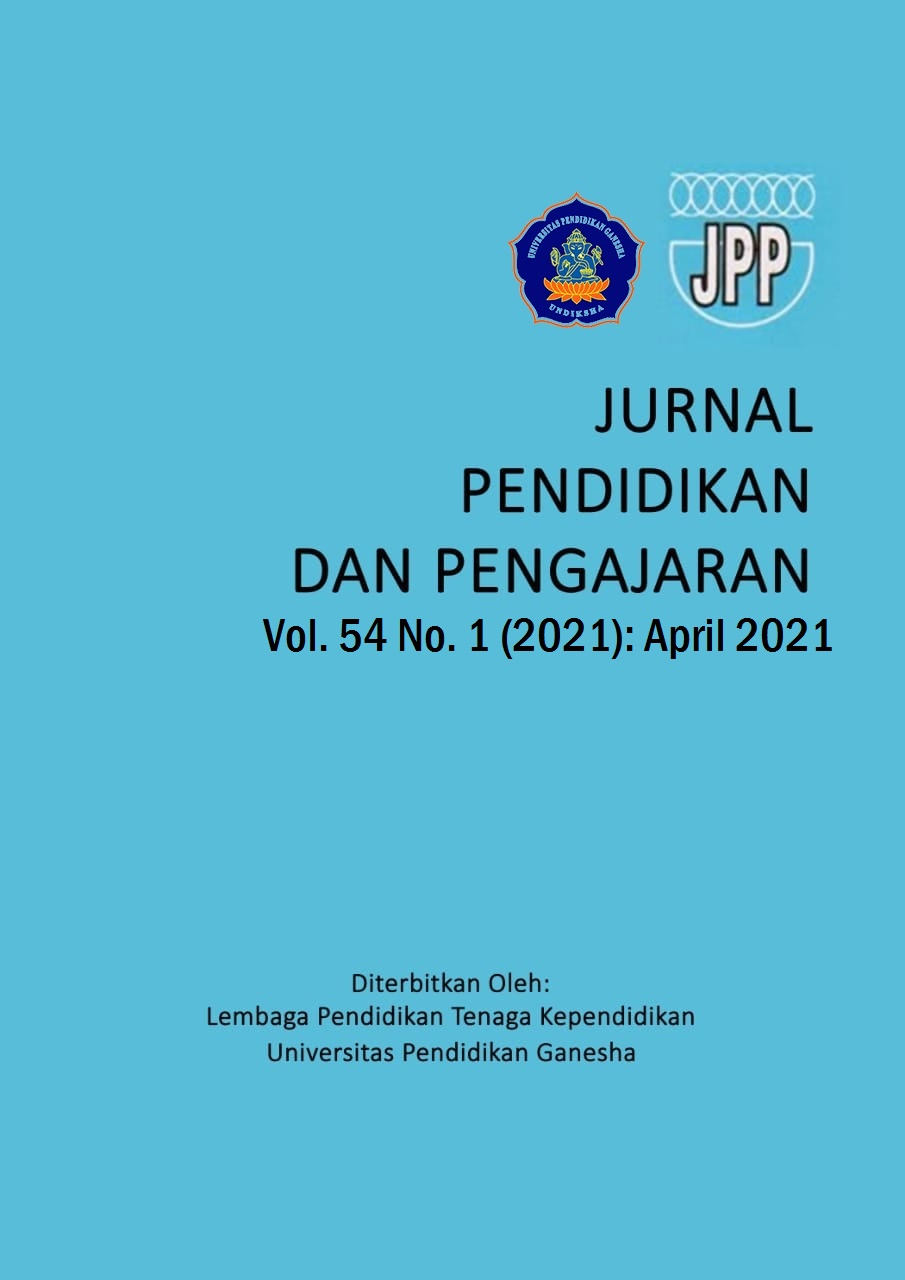Professional Development Activities of IELTS Trainers from Non-English Major
DOI:
https://doi.org/10.23887/jpp.v54i1.31609Keywords:
Autonomous Learners, Collaborative Learning, IELTSAbstract
Professional development activities are done by English teachers from formal educational institutions and by trainers from non-English majors who teach IELTS preparation program in non-formal educational institutions. This study investigated the professional development activities done by IELTS trainers from non-English majors and how the professional development activities help them improve their teaching competencies. A case study design was applied, and an in-depth interview and documentary analysis were used to gain the data. Four selected research subjects were involved in this study. The results showed that the IELTS trainers' professional development activities include collaborative and independent learning activities. Furthermore, those activities help the IELTS trainers from non-English majors positively as they can fulfill their demand to improve their teaching competencies since there is limited institutional support for them in professional development. Therefore, the institution where the IELTS trainers work should provide adequate formal learning supports. In addition, the IELTS trainers in this study and other IELTS trainers should be involved in other informal learning activities more frequently.
References
Ahmadi, S., Riasati, M. J., & Bavali, M. (2019). A Comparison of Writing Performance of Iranian IELTS Candidates Facing Chart Topics vs. Table Topics in Academic Writing (Task 1). International Journal of Instruction, 12(4), 17–34. https://doi.org/10.1080/2331186X.2019.1640655.
Anto, A. G., & Coenders, F. (2019). Teacher learning in collaborative professional development: Changes in teacher and student practices. In J. Pieters, J. Voogt, & N. P. Roblin (Eds.), Collaborative curriculum design for sustainable innovation and teacher learning.
Anugerahwati, M., & Saukah, A. (2010). Professional competence of English teachers in Indonesia: A profile of exemplary teachers. Indonesian Journal of English Language Teaching, 6(2), 47–59. https://doi.org/10.25170/ijelt.v6i2.1545.
Atay, D. (2008). Teacher research for professional development. ELT Journal, 62(2), 139–147. https://doi.org/10.1093/elt/ccl053.
Avalos, B. (2011). Teacher professional development in teaching and teacher education over ten years. Teaching and Teacher Education, 27(1), 10–20. https://doi.org/10.1016/j.tate.2010.08.007.
Baghaei, S., Bagheri, M. S., & Yamini, M. (2020). Analysis of IELTS and TOEFL reading and listening tests in terms of revised bloom’s taxonomy. Cogent Education, 7(1). https://doi.org/10.1080/2331186X.2020.1720939.
Chalhoub-Deville, M., & Turner, C. E. (2000). What to look for in ESL admission tests: Cambridge certificate exams, IELTS, and TOEFL. System, 28(4), 523–539. https://doi.org/https://doi.org/10.1016/S0346-251X(00)00036-1.
Chowdhury, S. A. (2009). Gaining proficiency in the reading module in IELTS: A study on the efforts of Bangladeshi students. Dhaka University Journal of Linguistics, 2(3), 125–140. https://doi.org/10.3329/dujl.v2i3.4148.
Dashti, L., & Razmjoo, S. A. (2020). An examination of IELTS candidates’ performances at different band scores of the speaking test: A quantitative and qualitative analysis. Cogent Education, 7(1). https://doi.org/10.1080/2331186X.2020.1770936.
Ellingson, J. E. R., & Noe., R. (2017). Autonomous learning in the workplace. Routledge.
Estaji, M., & Ghiasvand, F. (2019). The Washback Effect of IELTS Examination on EFL Teachers’ Perceived Sense of Professional Identity: Does IELTS Related Experience Make a Difference? Journal of Modern Research in English Language Studies, 6(3), 103. https://doi.org/10.30479/jmrels.2019.11123.1391.
Irmawati, D. I., Widiati, U., & Cahyono, B. Y. (2017). How do Indonesian professional English teachers develop their pedagogical competence in teaching implementation? Arab World English Journal, 8(2), 293–307. https://doi.org/10.24093/awej/ vol8no2.21.
Jones, W. M., & Dexter, S. (2014). How teachers learn: the roles of formal, informal, and independent learning. University of Virginia.
Kitsantas, A., & Dabbagh, N. (2012). Personal learning environment social media and self-regulated learning: A natural formula for connecting formal and informal learning. Internet and Higher Education, 15(1), 3–8. https://doi.org/10.1016/j.iheduc.2011.06.002.
Liton, A. (2012). Developing EFL Teaching And Learning Practices In Saudi Colleges: A Review. International Journal of Instruction, 5(2), 129-152.
Litz, D. (2005). Text Book Evaluation and ELT Management : a South Korea Case Study. Asian EFL Journal. https://docslide.us/documents/litz-thesis.html.
Masouleh, N. S., & Jooneghani, R. B. (2012). Autonomous learning: A teacher-less learning. Procedia-Social and Behavioral Sciences, 55, 835–842. https://doi.org/10.1016/j.sbspro.2012.09.570.
Murray, A. (2010). Empowering teachers through professional development. English Teaching Forum, 48(1), 2–11. https://eric.ed.gov/?id=EJ914883.
Priajana, N. (2017). Self and group initiated professional development pursuits of EFL teachers. Indonesian Journal of English Education, 4(1), 31–48. https://doi.org/10.15408/ijee.v4i1.6597.
Sari, D. F., Fitriani, S. S., & Emafetery, S. (2019). The strategy of Two Stay Two Stray to improve EFL students’ reading skill. Studies in English Language and Education, 6(1), 171–184. https://doi.org/10.24815/siele.v6i1.13057.
Seng, G. H., Muhamad, M., & Kiely, R. (2020). Integration of 21st century skills and teacher characteristics in ESL classrooms: The case of Malaysia. Universal Journal of Educational Research, 8(12), 7561–7566.
Simegn, B. (2014). EFL teachers’ self-initiated professional development: Perceptions and Practices. Academic Journals, 9(21), 1109–1114. ttps://eric.ed.gov/?id=EJ1045576.
Tuyen, L. (2015). An Investigation into the Use of the Course Book for Non-English Major Students at the Tertiary Level. International Journal on Studies in English Language and Literature, 3(6), 14–30.
Vo, L. T., & Nguyen, H. T. M. (2020). Critical friends group for EFL professional development. ELT Journal, 64(2), 205–213. https://doi.org/10.1093/elt/ccp025.
Yulia, M. F., Sulistyo, G. H., & Cahyono, B. Y. (2020). Affective engagement in academic reading: What EFL student teachers reveal. International Journal of Evaluation and Research in Education (IJERE), 9(3), 781–798. https://files.eric.ed.gov/fulltext/EJ1274719.pdf.
Downloads
Published
How to Cite
Issue
Section
License
Authors who publish with Jurnal Pendidikan dan Pengajaran agree to the following terms:- Authors retain copyright and grant the journal the right of first publication with the work simultaneously licensed under a Creative Commons Attribution License (CC BY-SA 4.0) that allows others to share the work with an acknowledgment of the work's authorship and initial publication in this journal
- Authors are able to enter into separate, additional contractual arrangements for the non-exclusive distribution of the journal's published version of the work (e.g., post it to an institutional repository or publish it in a book), with an acknowledgment of its initial publication in this journal.
- Authors are permitted and encouraged to post their work online (e.g., in institutional repositories or on their website) prior to and during the submission process, as it can lead to productive exchanges, as well as earlier and greater citation of published work. (See The Effect of Open Access)





